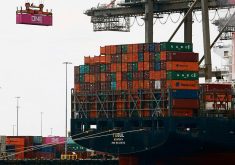Washington/Ottawa | Reuters — Restrictions on non-essential travel at U.S. land borders with Canada and Mexico will be extended through Aug. 21, Canada and the United States announced Thursday.
“Canada and the United States have agreed to extend the current border measures by one month until Aug. 21, and we’re going to keep working closely with our American neighbours to keep people safe on both sides of the border,” Canadian Prime Minister Justin Trudeau said at a news conference.
Earlier, acting U.S. Homeland Security Secretary Chad Wolf announced the 30-day extension on Twitter that “close collaboration with our neighbors has allowed us to respond to #COVID19 in a North American approach and slow the travel-related spread of the virus.”
Read Also

U.S. to seek more foreign tariff cuts, CUSMA improvements in 2026
The U.S. Trade Representative’s office said on Monday it will seek further reductions in foreign tariffs and non-tariff barriers this year, enforce its “reciprocal” trade deals and consider launching new unfair trade practices investigations.
Reuters reported Monday that Canada and the U.S. were set to extend a ban imposed to fight the coronavirus outbreak.
The rules, first issued in March, have been repeatedly extended in 30-day blocks.
The restrictions do not cover trade across a U.S.-Canada border that stretches 8,891 km, or air travel.
Passenger crossings have fallen by 90 per cent or more at many border crossings and hit tourist destinations along U.S. borders.
In May, passenger traffic in Detroit fell to 45,000 people crossing, down from 502,000 passengers crossing in February.
At San Ysidro, California, on the U.S.-Mexico border, passenger and pedestrian traffic fell from more than 2.9 million people crossing in February to 1.3 million in May.
The restrictions do not apply to travelers who are getting to work, or people travelling for family care, educational or humanitarian reasons.
— Reporting for Reuters by David Shepardson in Washington and Steve Scherer in Ottawa.















